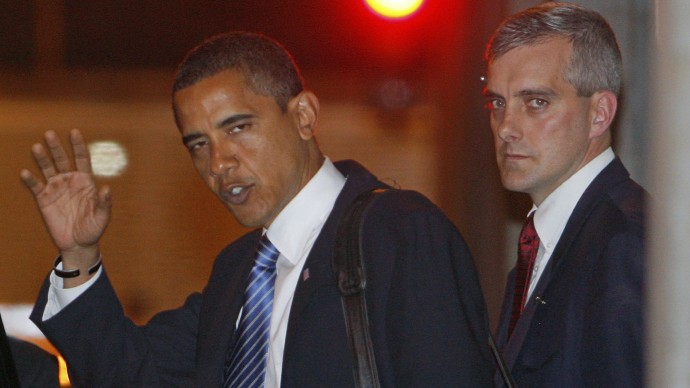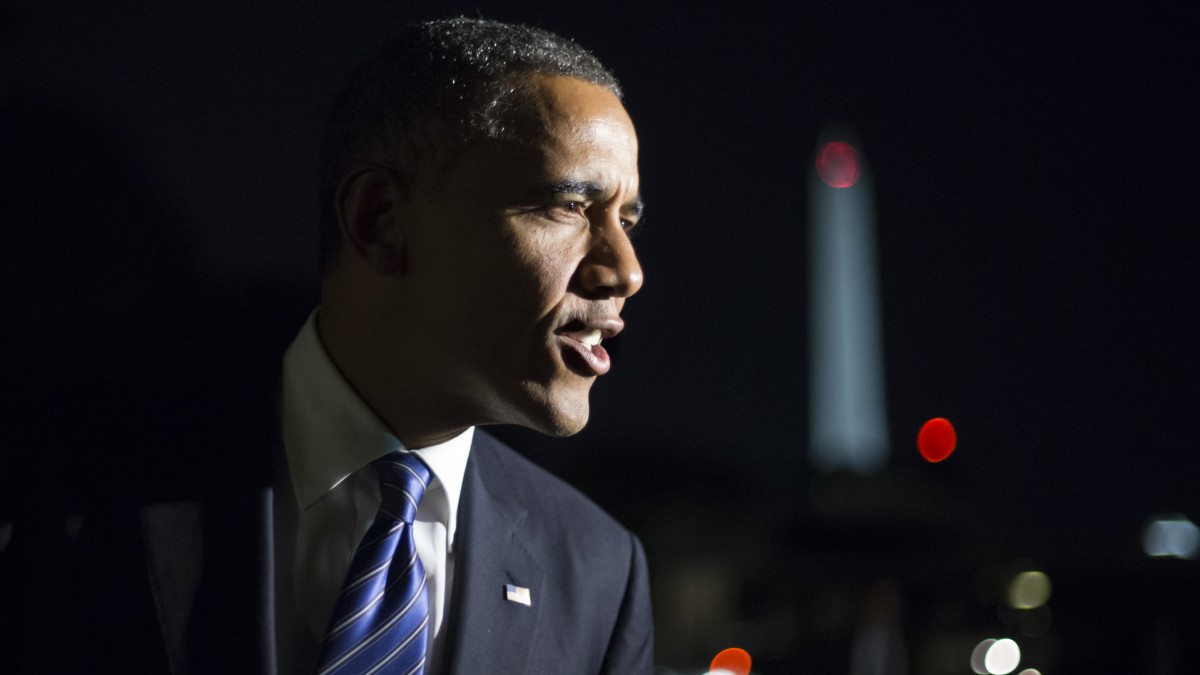
“Leaks related to national security can put people at risk. They can put men and women in uniform that I’ve sent into the battlefield at risk … and so I make no apologies, and I don’t think the American people would expect me, as commander in chief, not to be concerned about information that might compromise their missions or might get them killed.” – President Obama when asked about his Justice Department’s spying on Associated Press reporters.
The Justice Department has acknowledged seizing the work, home and cellphone records used by almost 100 reporters and editors at the Associated Press. The phones targeted included the general AP office numbers in New York City, Washington, D.C., and Hartford, Connecticut, and the main number for the AP in the House of Representatives press gallery.
The action is thought to be part of a probe into the leaks behind an AP story on the U.S. intelligence operation that stopped a Yemen-based al-Qaeda bombing plot on a U.S.-bound airplane.
President Obama’s recalcitrant and defiant response, however, is at odds with candidate Obama and President Obama of a month, and indeed, a couple of weeks ago. Candidate Obama promised on the campaign trail that he would have the most transparent administration in history.
Candidate Obama chided the Bush administration for its use of executive privilege to deflect criticism from some of its questionable actions: “There’s been a tendency, on the part of this administration, to try to hide behind executive privilege every time there’s something a little shaky that’s taking place …”
President Obama, at the White House Correspondence dinner – just last month – said, “And we also saw journalists at their best — especially those who took the time to wade upstream through the torrent of digital rumors to chase down leads and verify facts and painstakingly put the pieces together to inform, and to educate, and to tell stories that demanded to be told.”
President Obama, on May 3rd, World Press Freedom Day, stated that “we call on all governments to protect the ability of journalists, bloggers, and dissidents to write and speak freely without retribution and to stop the use of travel bans and other indirect forms of censorship to suppress the exercise of these universal rights.”
His duplicity is conspicuous: With one face he decries the constrictions placed on reporters in the performance of their duties; with his other face he engages in the most repressive campaign against whistleblowers and journalists in recent American history.
And yet, his actions are part of an international – and historical – campaign to dissuade the necessary work of investigative journalism and to silence the truth tellers of the Fourth Estate.
Looking back to see the present
The Alien and Sedition Acts of 1798 were four laws enacted by the Federalist-controlled U.S. Congress, allegedly in response to the hostile actions of the French Revolutionary government on the seas and in the councils of diplomacy, but actually designed to destroy Thomas Jefferson’s Republican party, which had openly expressed its sympathies for the French Revolutionaries.
Depending on recent arrivals from Europe for much of their voting strength, the Republicans were adversely affected by the Naturalization Act (yes, this writer gets the irony), which postponed citizenship, and thus voting privileges, until the completion of 14 (rather than 5) years of residence, and by the Alien Act and the Alien Enemies Act, which gave the President the power to imprison or deport aliens suspected of activities posing a threat to the national government. President John Adams made no use of the alien acts.
Journalists and reporters, however, felt the weight of these laws as well. Most controversial, however, was the Sedition Act, devised to silence Republican criticism of the Federalists. Its broad proscription of spoken or written criticism of the government, the Congress, or the President essentially nullified the First Amendment freedoms of speech and the press.
Prominent subscribers of the Jeffersonian ethos, the vast majority of them journalists, such as John Daly Burk, James T. Callender, Thomas Cooper, William Duane, and Matthew Lyon were tried, and some were convicted, in sedition proceedings – Lyon was the first person to be put on trial under the Sedition Act.
So instead of the Alien and Sedition Acts, the Obama administration uses the 1917 Foreign Secrets Act, which was first used against Daniel Ellsberg in the Pentagon Papers case. An act not meant to prosecute whistleblowers and reporters has been directed at Kiriakou, Drake and others – with Kiriakou being convicted.
Can’t we see the seeds of this ideology germinating within the actions of some of most recent presidential administrations – especially within the Obama administration? Think about it: This republic was in its infancy – with a constitution just a little over a decade old – when partisans took an axe to the root of the tree of democracy, the First Amendment.
The international suppression and slaughter of journalists
According to a recent Amnesty International report, Syria is the deadliest country in the world for journalists. At least 46 people have been slain while reporting on its civil conflict between March 2011 and late April 2013, most of them Syrian nationals, according to UNESCO.
Journalists have been targeted by both government forces and rebels, some of them deliberately attacked for their work. Government forces are believed to have abducted, tortured and killed reporters, according to testimony gathered by Amnesty.
Rebel fighters have publicly threatened journalists thought to be sympathetic to the Syrian government. At least seven journalists are now missing in Syria, according to the Agence France-Presse.
Syria isn’t the only transgressor, however, in this fight against truth-telling. Abdihared Osman Aden, from Somalia, was shot dead by unidentified men while walking to work on January 19, 2013. He is one of at least 23 journalists killed in the country since 2011.
Last November, Palestinian cameramen Hussam Salameh and journalist Mahmoud al-Koumi, from the Hamas-affiliated Al-Aqsa TV, were killed by a targeted Israeli missile strike on their car in Gaza City. Amnesty International found no evidence that either was anything other than a civilian journalist, despite claims by military authorities in Israel that both were “Hamas operatives.”
These occurrences are tragic and egregious, but they are not the only types of repression that is taking place against journalist from around the globe. In Iran, at least 18 journalists have been arrested since January 2013, accused of cooperating with “anti-revolutionary” media organizations outside Iran. Dozens of journalists and bloggers are now behind bars in Iran.
Abdiaziz Abdinur Ibrahim, in February of this year, was sentenced to one-year imprisonment in Mogadishu, Somalia, for insulting a national institution after interviewing a woman who reported being raped by government forces. The case was, effectively invalidated in March by the Supreme Court.
These examples, in a cruel and twisted way, give cover to the Obama administration, because they can say, “Well, we’re not as bad as those other countries.”
And while President Obama tries to hold at bay the questions concerning his administration’s evisceration of First Amendment freedoms, the Assanges and Mannings of the world continue to languish under a cloud of persecution. It appears that anyone who challenges the official narrative and exposes cases of torture, war crimes and abuse of governmental power is mercilessly silenced.
Conclusion
“Our courts oppose the righteous, and justice is nowhere to be found. Truth stumbles in the streets, and honesty has been outlawed. Yes, truth is gone, and anyone who renounces evil is attacked.” – Isaiah
David Cay Johnston, Pulitzer Prize-winning journalist and the president of Investigative Reporters and Editors said in a recent interview, “I and many other journalists have observed that this administration, despite its public rhetoric, has repeatedly and continually been very difficult to deal with. I rate them worse than the Bush administration.
“…And every single story that I wrote at The New York Times, with one exception, had Bush people on the record by name, rank and serial number. So, this is a very troubling aspect of this administration. It is hostile to the news media. It seems to have an attitude that if they don’t like the question, they don’t have to answer it. And it makes it very difficult and cumbersome to get responses from there. They’re be having much more like a corporation than like the people’s government.”
And while this assault on truth-tellers is taking place – and yes, this writer has said it before – not one prosecution of a government official for torture and war crimes and not one prosecution of any high-level executive for the corporate malfeasance that led to the crash of 2008.
Obama’s denunciation of the Bush administration now haunts him – he has become that which he condemned, but, as he said, he makes no apologies. And although he isn’t sorry, the same can’t be said of those who prize truth above partisanship; and for those who believe the First Amendment is not a mere suggestion, but the heartbeat of democracy itself.


